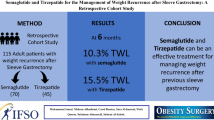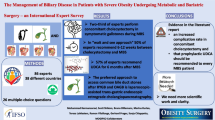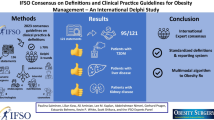Opinion statement
This article reviews various methods of assessing and managing post-gastrectomy or esophagectomy patients from a nutritional standpoint, by examining recent research focusing on assessment models, components of enteral feeding, timing of feeding, safety of enteral nutrition (EN) vs total parenteral nutrition (TPN), appetite stimulants, alternative treatments, and long-term care. Pre-, peri-, and post-operative nutrition represent a major prognostic indicator in patients undergoing a gastrectomy or esophagectomy for malignant cancer. An accurate initial nutrition assessment to determine risk, followed by close monitoring pre-operatively and early enteral feeding post-operatively, has been shown to have the most beneficial effects. The optimal delivery route for nutrition involves the use of EN with immune enhancing nutrients while avoiding TPN. In practice, TPN is reserved for patients with post-operative complications that delay enteral feeding for an extended time. While megace is commonly used as an appetite stimulant, the hormone ghrelin is another novel, safe, and efficacious treatment to improve appetite, increase by mouth (PO) intake, and minimize loss of weight and lean body mass. Although use of ghrelin is not yet common practice, as more studies are published, we predict that this will become a more common treatment. While complementary and alternative therapies are commonly employed in this patient population, more research needs to be done before incorporation into our mainstay of treatment. Long term, these patients continue to be at nutritional risk and therefore should be followed to optimize weight maintenance and prevent micronutrient deficiencies.
Similar content being viewed by others
References and Recommended Reading
Papers of particular interest, published recently, have been highlighted as: • Of importance. •• Of major importance
••Bower MR, Martin RC: Nutritional management during neoadjuvant therapy for esophageal cancer. J Surg Oncol 2009, 100(1):82–87
This current literature review examines recent research surrounding the nutrition management of patients with esophageal cancer, exploring current topics in enteral and parenteral nutrition, as well as stenting.
•August DA, Huhmann MB: American Society for Parenteral and Enteral Nutrition (A.S.P.E.N.) Board of Directors. A.S.P.E.N. clinical guidelines: Nutrition support therapy during adult anticancer treatment and in hematopoietic cell transplantation. JPEN J Parenter Enteral Nutr 2009, 33(5):472–500
A widely accepted reference for clinical nutrition in regards to enteral and parenteral nutrition, these clinical guidelines are derived from a metaanalysis of nutrition support therapy during adult anticancer treatment.
Nitenberg G, Raynard B: Nutritional support of the cancer patient: Issues and dilemmas. Crit Rev Oncol Hematol 2000, 34(3):137–168.
Detsky AS, Smalley PS, Chang J: The rational clinical examination: Is this patient malnourished? JAMA 1994, 271(1):54–58.
Nozoe T, Kimura Y, Ishida M, Saeki H, Korenaga D, Sugimachi K: Correlation of pre-operative nutritional condition with post-operative complications in surgical treatment for oesophageal carcinoma. Eur J Surg Oncol 2002, 28(4):396–400.
Guo W, Ou G, Li X, Huang J, Liu J, Wei H: Screening of the nutritional risk of patients with gastric carcinoma before operation by NRS 2002 and its relationship with postoperative results. J Gastroenterol Hepatol 2010, 25(4):800–803.
Kondrup J, Rasmussen HH, Hamberg O, Stanga Z, Ad Hoc ESPEN Working Group: Nutritional risk screening (NRS 2002): A new method based on an analysis of controlled clinical trials. Clin Nutr 2003, 22(3):321–336.
Demeyer I, Bataillie K, Baute L: Long-term sedation in the ICU: Enteral versus parenteral feeding. Clin Intensive Care 1994, 5(5 Suppl):13–16.
Gabor S, Renner H, Matzi V, Ratzenhofer B, Lindenmann J, Sankin O, et al.: Early enteral feeding compared with parenteral nutrition after oesophageal or oesophagogastric resection and reconstruction. Br J Nutr 2005, 93(4):509–513.
Kamei H, Hachisuka T, Nakao M, Takagi K: Quick recovery of serum diamine oxidase activity in patients undergoing total gastrectomy by oral enteral nutrition. Am J Surg 2005, 189(1):38–43.
•Peter JV, Moran JL, Phillips-Hughes J: A metaanalysis of treatment outcomes of early enteral versus early parenteral nutrition in hospitalized patients. Crit Care Med 2005, 33(1):213–220
This metaanalysis of randomized controlled trials compares early EN with PN and shows early EN significantly reducing complication rates for patients that are treated in hospitals.
Lidder P, Flanagan D, Fleming S, Russell M, Morgan N, Wheatley T, et al.: Combining enteral with parenteral nutrition to improve postoperative glucose control. Br J Nutr 2010, 103(11):1635–1641.
Sakurai Y, Kanaya S, Komori Y, Uyama I: Is postoperative early enteral nutrition with regular or disease-specific enteral formula really beneficial in patients undergoing esophagectomy? Esophagus 2009, 6(3):149–154.
•Hur H, Si Y, Kang WK, Kim W, Jeon HM: Effects of early oral feeding on surgical outcomes and recovery after curative surgery for gastric cancer: Pilot study results. World J Surg 2009, 33(7):1454–1458
A clinical trial that assesses the recovery of 31 patients from a gastric resection, demonstrating early postoperative PO feeding resulting in faster recovery of bowel function and a decreased hospital LOS.
Okamoto Y, Okano K, Izuishi K, Usuki H, Wakabayashi H, Suzuki Y: Attenuation of the systemic inflammatory response and infectious complications after gastrectomy with preoperative oral arginine and (omega)-3 fatty acids supplemented immunonutrition. World J Surg 2009, 33(9):1815–1821.
Nakamura M, Iwahashi M, Takifuji K, Nakamori M, Naka T, Ishida K, et al.: Optimal dose of preoperative enteral immunonutrition for patients with esophageal cancer. Surg Today 2009, 39(10):855–860.
Asprer JM, Llido LO, Sinamban R, Schlotzer E, Kulkarni H: Effect on immune indices of preoperative intravenous glutamine dipeptide supplementation in malnourished abdominal surgery patients in the preoperative and postoperative periods. Nutrition 2009, 25(9):920–925.
Loï C, Zazzo JF, Delpierre E, Niddam C, Neveux N, Curis E, Arnaud-Battandier F, Cynober L: Increasing plasma glutamine in postoperative patients fed an arginine-rich immune-enhancing diet—a pharmacokinetic randomized controlled study. Crit Care Med 2009, 37(2):501–509.
van Stijn MF, Boelens PG, Richir MC, Ligthart-Melis GC, Twisk JW, Diks J, et al.: Antioxidant-enriched enteral nutrition and immuno-inflammatory response after major gastrointestinal tract surgery. Br J Nutr 2010, 103(3):314–318.
Karcz W, Gluszek S, Kot M, Matykiewicz J: Influence of nutritional treatment on the postoperative course in patients with gastric cancer. Adv Med Sci 2006, 51:278–282.
•Ryan AM, Reynolds JV, Healy L, Byrne M, Moore J, Brannelly N, et al.: Enteral nutrition enriched with eicosapentaenoic acid (EPA) preserves lean body mass following esophageal cancer surgery: Results of a double-blinded randomized controlled trial. Ann Surg 2009, 249(3):355–363
A randomized control trial evaluating the efficacy and dosage of EPA both preoperatively and POD 21, this study found that EPA enriched EN maintained lean body mass compared to standard formula.
•Heller AR, Rossel T, Gottschlich B, Tiebel O, Menschikowski M, Litz RJ, et al.: Omega-3 fatty acids improve liver and pancreas function in postoperative cancer patients. Int J Cancer 2004, 111(4):611–616
This prospective, randomized, double-blinded clinical trial compares the effects of soybean oil with a combination of fish oil and soybean oil in parenteral nutrition for gastrectomized patients. The study found that the combination of FO and SO decreased lean body mass loss, decreased ICU stay, and retained healthier liver and pancreas function.
•Adachi S, Takiguchi S, Okada K, Yamamoto K, Yamasaki M, Miyata H, et al.: Effects of ghrelin administration after total gastrectomy: A prospective, randomized, placebo-controlled phase II study. Gastroenterology 2010, 138(4):1312–1320.
A prospective, randomized, placebo controlled phase II study that examines the effects of ghrelin administration after total gastrectomy, this research displays the efficacy of ghrelin, which may be more widely prescribed in the future.
An JY, Choi MG, Noh JH, Sohn TS, Jin DK, Kim S: Clinical significance of ghrelin concentration of plasma and tumor tissue in patients with gastric cancer. J Surg Res 2007, 143(2):344–349.
Wang HT, Lu QC, Wang Q, Wang RC, Zhang Y, Chen HL, et al.: Role of the duodenum in regulation of plasma ghrelin levels and body mass index after subtotal gastrectomy. World J Gastroenterol 2008, 14(15):2425–2429.
Jeon TY, Lee S, Kim HH, Kim YJ, Lee JG, Jeong DW, et al.: Long-term changes in gut hormones, appetite and food intake 1 year after subtotal gastrectomy with normal body weight. Eur J Clin Nutr 2010, 64(8):826–831.
Yamamoto K, Takiguchi S, Miyata H, Adachi S, Hiura Y, Yamasaki M, et al.: Randomized phase II study of clinical effects of ghrelin after esophagectomy with gastric tube reconstruction. Surgery (USA) 2010, 148(1):31–38.
Strasser F, Lutz TA, Maeder MT, Thuerlimann B, Bueche D, Tschöp M, Kaufmann K, Holst B, Brändle M, von Moos R, Demmer R, Cerny T: Safety, tolerability and pharmacokinetics of intravenous ghrelin for cancer-related anorexia/cachexia: A randomised, placebo-controlled, double-blind, double-crossover study. Br J Cancer 2008, 98(2):300–308.
Deutsch J, Kolhouse JF: Assessment of gastrointestinal function and response to megesterol acetate in subjects with gastrointestinal cancers and weight loss. Support Care Cancer 2004, 12(7):503–510.
Berenstein EG, Ortiz Z: Megestrol acetate for the treatment of anorexia-cachexia syndrome. Cochrane Database Syst Rev 2005, 2:004310.
Kang I, Kim YS, Kim C: Mineral deficiency in patients who have undergone gastrectomy. Nutrition 2007, 23:318–322.
Beyer PL: Medical nutrition therapy for upper gastrointestinal tract disorders. In Krause’s food nutrition & diet therapy. Edited by Mahan LK, Escott-Stump S. Philadelphia: Saunders; 2004:687–702.
Mine S, Sano T, Tsutsumi K, Murakami Y, Ehara K, Saka M, et al.: Large-scale investigation into dumping syndrome after gastrectomy for gastric cancer. J Am Coll Surg 2010, 211(5):628–636.
•Koga M, Murai J, Saito H, Mukai M, Matsumoto S, Kasayama S: Glycated albumin levels are higher relative to glycated haemoglobin levels in gastrectomized subjects. Ann Clin Biochem 2010, 47(1):39–43
This study compares the biomarkers HbA1c and GA in regards to their accuracy as a test for glycemic excursion, and finds GA to be the superior indicator.
Mimura EC, Breganó JW, Dichi JB, Gregório EP, Dichi I: Comparison of ferrous sulfate and ferrous glycinate chelate for the treatment of iron deficiency anemia in gastrectomized patients. Nutrition 2008, 24(7–8):663–668.
Takahashi T, Endo S, Nakajima K, Souma Y, Nishida T: Effect of rikkunshito, a Chinese herbal medicine, on stasis in patients after pylorus-preserving gastrectomy. World J Surg 2009, 33(2):296–302.
Endo S, Nishida T, Nishikawa K, Nakajima K, Hasegawa J, Kitagawa T, et al.: Dai-kenchu-to, a Chinese herbal medicine, improves stasis of patients with total gastrectomy and jejunal pouch interposition. Am J Surg 2006, 192(1):9–13.
US National Institutes of Health Clinical Trials: Oral vitamin B12 administration for vitamin B12 deficiency after total gastrectomy. http://clinicaltrials.gov/ct2/show/NCT00699478?term=00699478&rank=1. Accessed November 18, 2010
US National Institutes of Health Clinical Trials: Efficacy and safety comparison between SMOFlipid and lipovenoes MCT. http://clinicaltrials.gov/ct2/show/NCT00885781?term=NCT00885781&rank=1. Accessed November 18, 2010
US National Institutes of Health Clinical Trials: The impact of low calorie and low nitrogen parenteral nutrition support on the clinical outcome of postoperative patients. http://clinicaltrials.gov/ct2/show/NCT00247338?term=NCT00247338&rank=1. Accessed November 18, 2010
US National Institutes of Health Clinical Trials: Perioperative nutrition in upper gastrointestinal (GI) cancer surgery. http://clinicaltrials.gov/ct2/show/NCT00560846?term=NCT00560846&rank=1. Accessed November 18, 2010
Author information
Authors and Affiliations
Corresponding author
Additional information
An erratum to this article can be found at http://dx.doi.org/10.1007/s11864-011-0142-8
Rights and permissions
About this article
Cite this article
Baker, A., Wooten, LA. & Malloy, M. Nutritional Considerations After Gastrectomy and Esophagectomy for Malignancy. Curr. Treat. Options in Oncol. 12, 85–95 (2011). https://doi.org/10.1007/s11864-010-0134-0
Published:
Issue Date:
DOI: https://doi.org/10.1007/s11864-010-0134-0




